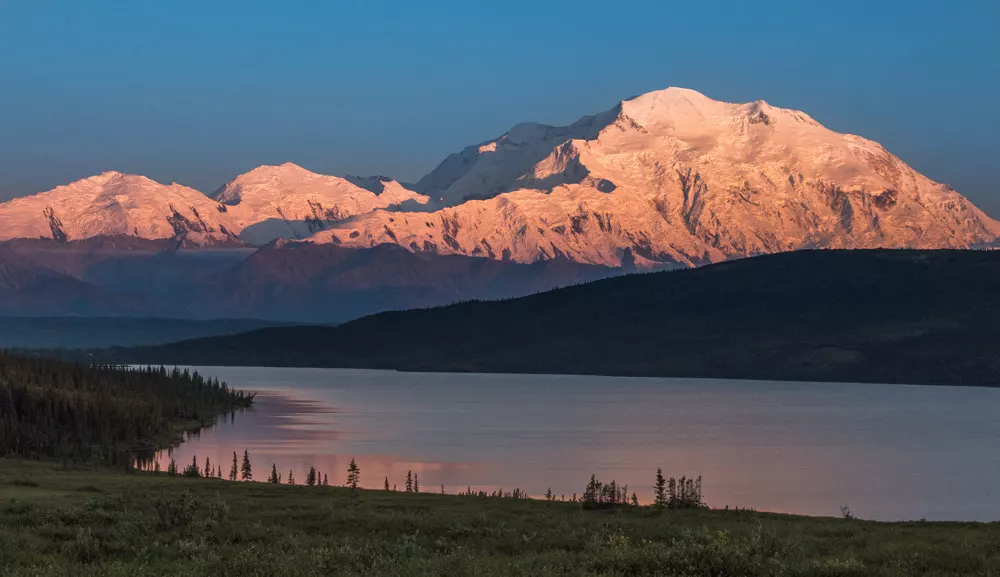
- Details
- By Kaili Berg
President-elect Donald Trump has announced plans to change the name of Mount Denali in Alaska back to Mount McKinley, reigniting a longstanding debate about the cultural and historical significance of place names.
Trump’s remarks, seen as an appeal to specific political bases, have raised concerns among Alaska Native communities and other Indigenous groups who view such actions as a disregard for their cultural heritage.
Mount Denali, the tallest peak in North America, holds deep cultural and spiritual significance for the Koyukon Athabaskan people, who have called it "Denali," meaning "The High One," for generations.
In 2015, the Obama administration restored the mountain’s original name, Denali, following decades of advocacy from Alaska Natives. The decision was celebrated across Indigenous communities as a recognition of Native heritage and a step toward addressing historical erasure.
The move was part of a broader effort to restore Indigenous names to significant landmarks, a practice viewed by many tribes as an essential element of cultural revitalization.
The name "Mount McKinley" was first applied in 1896 by a gold prospector who chose to honor then-presidential candidate William McKinley—a man with no ties to Alaska who never visited the region. For Alaska Natives, McKinley’s name is a lasting symbol of colonization and the marginalization of Native history.
For many, reverting to "Mount McKinley" represents a setback in the ongoing effort to acknowledge Indigenous peoples' deep ties to the land. Place names are more than labels; they carry stories, histories, and identities that shape a region’s cultural landscape. Changing Denali’s name back to one imposed during colonization undermines progress in decolonizing these narratives.
Across the U.S., Indigenous communities have increasingly advocated for restoring Native names to landmarks as a means of reclaiming history and fostering cultural awareness. For example, the Squamish Nation successfully renamed British Columbia’s Stawamus Chief to "Sḵwx̱wú7mesh Chief," and the Cheyenne and Arapaho Tribes have pushed to rename Devils Tower in Wyoming.
Trump’s proposal may resonate with certain constituencies but highlights a broader cultural divide in how America reckons with its history. For Indigenous communities, preserving the name Denali is about far more than a mountain—it is a fight for cultural recognition and the visibility of Native peoples in a society that has often sought to erase them.
More Stories Like This
Native News Weekly (August 25, 2024): D.C. BriefsUS Presidents in Their Own Words Concerning American Indians
Indigenous Actor Elaine Miles Reports Detention by Alleged ICE Agents
Happy Thanksgiving from Native News Online
Coming Up on Native Bidaské: Behind the Animation: Joey Clift Talks “Pow” and Native Storytelling
Help us tell the stories that could save Native languages and food traditions
At a critical moment for Indian Country, Native News Online is embarking on our most ambitious reporting project yet: "Cultivating Culture," a three-year investigation into two forces shaping Native community survival—food sovereignty and language revitalization.
The devastating impact of COVID-19 accelerated the loss of Native elders and with them, irreplaceable cultural knowledge. Yet across tribal communities, innovative leaders are fighting back, reclaiming traditional food systems and breathing new life into Native languages. These aren't just cultural preservation efforts—they're powerful pathways to community health, healing, and resilience.
Our dedicated reporting team will spend three years documenting these stories through on-the-ground reporting in 18 tribal communities, producing over 200 in-depth stories, 18 podcast episodes, and multimedia content that amplifies Indigenous voices. We'll show policymakers, funders, and allies how cultural restoration directly impacts physical and mental wellness while celebrating successful models of sovereignty and self-determination.
This isn't corporate media parachuting into Indian Country for a quick story. This is sustained, relationship-based journalism by Native reporters who understand these communities. It's "Warrior Journalism"—fearless reporting that serves the 5.5 million readers who depend on us for news that mainstream media often ignores.
We need your help right now. While we've secured partial funding, we're still $450,000 short of our three-year budget. Our immediate goal is $25,000 this month to keep this critical work moving forward—funding reporter salaries, travel to remote communities, photography, and the deep reporting these stories deserve.
Every dollar directly supports Indigenous journalists telling Indigenous stories. Whether it's $5 or $50, your contribution ensures these vital narratives of resilience, innovation, and hope don't disappear into silence.
 The stakes couldn't be higher. Native languages are being lost at an alarming rate. Food insecurity plagues many tribal communities. But solutions are emerging, and these stories need to be told.
The stakes couldn't be higher. Native languages are being lost at an alarming rate. Food insecurity plagues many tribal communities. But solutions are emerging, and these stories need to be told.
Support independent Native journalism. Fund the stories that matter.
Levi Rickert (Potawatomi), Editor & Publisher

